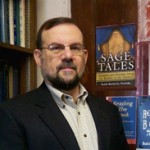The Torah portion of Vayehi brings to a close the story of Joseph and his brothers—the longest and most detailed of the family sagas in the book of Genesis. Reading this complicated narrative of family tension, cruelty, and ultimate reconciliation in the same week that the world mourns the death of Nelson Mandela, it is difficult not to hear echoes between the Biblical account of Joseph and the real-world experiences of the beloved South African leader.
On the simplest level, we have two stories of prisoners becoming heads of state; of the powerless ultimately achieving enormous political power and transforming the countries they come to lead. Joseph, of course, was not engaged in a political struggle for liberation; his rise to power is a personal success story. As a Hebrew taking on the trappings of Egyptian royalty, he represents the archetypal court Jew—powerful for a time, as long as he has the Pharaoh’s favor. Joseph uses this power in complicated ways: he manages to save his family from starvation and to rescue the Egyptian populace from famine, but in so doing reduces the entire population to serfdom. One could argue that the very structures of oppression that lead to the enslavement of the Israelites in the beginning of Exodus are actually put in place by the erstwhile savior, Joseph.
Mandela, in contrast, ended up in prison as part of a life-long struggle for racial and economic justice. His rise to political power was not granted by a grateful Pharaoh but gained as part of a decades-long national liberation struggle. What Mandela seems to have shared with the biblical Joseph was an enormous amount of courage and chutzpah, a canny political sense, and a strong belief in the capacity for human transformation.
It is in this last characteristic that we see the most powerful parallel in the Joseph/Mandela stories. The Joseph saga, in contrast to earlier Torah stories about sibling rivalry and family dysfunction, introduces the possibility of true reconciliation. Leading up to Joseph’s ultimate forgiveness of his brothers is a repetitive trope of brotherly tension and hate, including trickery, theft, and murder. From Cain killing Abel to Jacob’s theft of Esau’s blessing to Joseph’s brothers throwing him into a pit, the cycle of sibling rivalry is ongoing throughout the book of Genesis. We see brothers come together to bury their fathers, but we never see them live together as adults.
In last week’s Torah portion, Joseph revealed himself to his brothers more than 20 years after they sold him into slavery, saying: “I am your brother Joseph, whom you sold into Egypt! And now, do not be distressed and do not be angry with yourselves for selling me here, because it was to save lives that God sent me ahead of you” (Genesis 45:4-5). Having seen real change in his brothers, Joseph seems to let go of the anger he felt towards them. For the first time in the Torah, true reconciliation seems possible. In the words of Rabbi Jonathan Sacks:
Joseph forgives. That is a first in history. There is even a hint in the Torah of the newness of this event. Many years later, after their father Jacob has died, the brothers come to Joseph fearing that he will now take revenge…Did Joseph really mean it the first time? Does someone really forgive those who sold him into slavery? Joseph weeps that his brothers haven’t really understood that he meant it when he said it. But he did, then and now.
The brothers’ suspicion speaks to the complicated nature of reconciliation. They wonder, as do we: can a person—or an entire people—who has been brutalized, enslaved and degraded, ever fully forgive his or her oppressor? How is such a thing possible? Joseph’s legacy is complex, but his ability to truly let go of any desire for revenge against his brothers is one powerful lesson of this Torah tale.
One of Nelson’s Mandela’s greatest gifts to the world is that he showed us—just as Joseph showed his brothers—the possibility of reconciliation in the wake of unspeakable brutality and oppression. As President of South Africa, Mandela taught, “Reconciliation means working together to correct the legacy of past injustice.” This process involves perpetrators telling the truth about the injustices they committed, acknowledging the hurt and damage they caused to others, and accepting punishment for their actions. It also involves the victims of injustice working to overcome their desire for vengeance. Mandela’s personal experience of transformation translated into a vision of transformation for all of South Africa.
Nelson Mandela was not a miracle worker. Democracy and the dismantling of apartheid did not bring an end to poverty or of deeply entrenched racial divisions in his country. We would do a disservice to his memory if we were to only celebrate his successes and ignore the greater goals that he hoped to achieve. As he said at the delivery of the Truth and Reconciliation Commission’s report in 1998,
Reconciliation demands that we join hands to eradicate the poverty spawned by a system that thrived on the deprivation of the majority. Reconciliation requires that we end malnutrition, homelessness and ignorance… It demands that we put shoulders to the wheel to end crime and corruption.
Those lofty goals are far from being met in South Africa, or here in the U.S., for that matter. Mandela’s legacy to us is to hold out the greater vision of reconciliation, a dream of justice grounded in a profound faith in the human capacity to change.
Rabbi Toba Spitzer is the spiritual leader of Congregation Dorshei Tzedek in West Newton, MA (www.dorsheitzedek.org). She is a former president of the Reconstructionist Rabbinical Association, and was the first openly gay or lesbian rabbi to serve as the head of a national rabbinic organization. Rabbi Spitzer has been involved for many years in work for social and economic justice in the U.S. and for Middle East peace. Her life goal is to bowl in every state (31 down so far!).
ON Scripture — The Torah is a weekly Jewish scriptural commentary, produced in collaboration with Odyssey Networks and Hebrew College. Thought leaders from the United States and beyond offer their insights into the weekly Torah portion and contemporary social, political, and spiritual life.
















